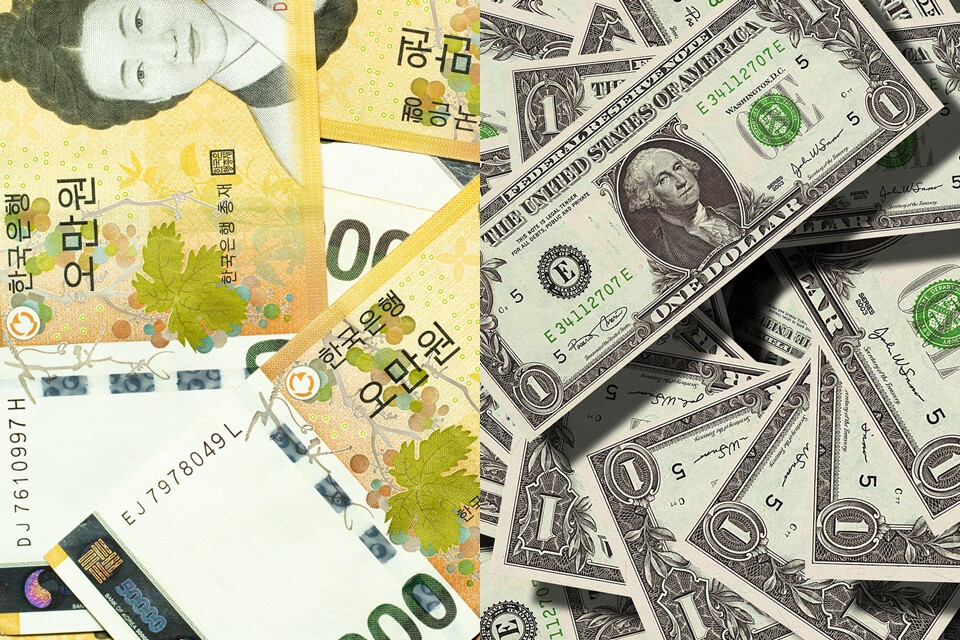
While the U.S. dollar has experienced a significant depreciation of nearly 10% against a cohort of major global currencies, the South Korean won has exhibited a comparatively modest appreciation of a mere 3%. This tepid rebound in the won's value, despite the dollar's pronounced weakness, underscores the pervasive anxieties gripping the South Korean economy, primarily fueled by the escalating U.S.-China trade dispute and its anticipated repercussions on global growth. The reluctance of foreign investors to embrace the won, evidenced by persistent sell-offs, paints a concerning picture of the headwinds facing Asia's fourth-largest economy.
According to data from Investing.com, the U.S. Dollar Index (DXY), a benchmark gauging the dollar's strength against a basket of six key currencies (Euro, Japanese Yen, British Pound, Canadian Dollar, Swedish Krona, and Swiss Franc), concluded the latest week's trading at 99.397. This figure marks a substantial 9.5% decline from its year-to-date peak of 109.812 recorded on January 13th. Historically, a weakening dollar often translates to a strengthening of other currencies, including those of emerging markets like South Korea. However, the won-dollar exchange rate has defied this conventional pattern. Over the same period, the won has only marginally strengthened, moving from 1470.8 won per dollar on January 13th to 1424.1 won as of the previous day, representing a dollar depreciation (or won appreciation) of a meager 3.2%.
This divergence has prompted economists to voice concerns about the underlying vulnerabilities of the South Korean economy. Lee Min-hyuk, a seasoned economist at KB Kookmin Bank, posits that with the Dollar Index hovering around the 100 mark, the equilibrium level for the won-dollar exchange rate should ideally be below 1350 won. He asserts that the won is currently undervalued by at least 5% against the greenback, suggesting that fundamental factors are suppressing its potential for appreciation.
The primary culprit behind the won's lackluster performance appears to be the protracted and increasingly acrimonious trade war between the United States and China. South Korea's highly export-oriented economy is particularly susceptible to the vagaries of global trade dynamics. The imposition of tariffs and the resultant disruptions to global supply chains have cast a long shadow over South Korea's export prospects, a critical engine of its economic growth. The specter of stagnant global demand, exacerbated by the trade tensions, has led foreign investors to reassess their exposure to the won, triggering a wave of selling pressure.
Furthermore, a confluence of domestic factors is compounding the won's woes. Persistent weakness in domestic consumption, fueled by factors such as high household debt and tepid wage growth, has further dampened investor sentiment. The looming threat of a significant slowdown in exports, a cornerstone of the Korean economic model, adds another layer of concern. Moreover, the prevailing political uncertainty, particularly in the lead-up to a potential early presidential election, is exacerbating market volatility and prompting risk-averse foreign investors to offload won-denominated assets in favor of safer havens.
Seo Jeong-hoon, a leading currency strategist at Hana Bank, echoes these concerns, stating that "foreign capital has witnessed a rapid outflow due to the assessment that a global economic downturn could significantly amplify the shock to the domestic economy. This capital flight is undeniably contributing to the weakening of the won." He further emphasizes the role of political risk, noting that "the anticipation of an early presidential election introduces a layer of political instability, further incentivizing investors to reduce their holdings of the Korean currency."
The persistent undervaluation of the won and the heightened exchange rate volatility are presenting a formidable dilemma for the Monetary Policy Committee (MPC) of the Bank of Korea (BOK), as it prepares for its upcoming benchmark interest rate decision on the 17th. On one hand, the sluggish domestic economy arguably necessitates a cut in the benchmark interest rate to stimulate consumption and bolster growth. Lower interest rates typically reduce borrowing costs for businesses and consumers, theoretically encouraging investment and spending. However, such a move could further exacerbate the undervaluation of the won and potentially trigger additional capital outflows, thereby undermining the currency's stability.
On the other hand, maintaining the current interest rate, or even considering a hike to support the won, could further stifle already weak domestic demand and risk tipping the economy into a deeper slowdown. The BOK finds itself in a precarious position, forced to navigate the conflicting pressures of supporting domestic growth while safeguarding the stability of the national currency in the face of external headwinds and domestic vulnerabilities. The MPC's decision will be closely scrutinized by market participants, as it will offer crucial insights into the central bank's assessment of the prevailing economic risks and its policy priorities in this challenging environment. The won's anemic response to the dollar's broad weakening serves as a stark reminder of the intricate and often unpredictable interplay of global trade tensions, domestic economic fundamentals, and investor sentiment in shaping currency valuations and the overall economic outlook.
[Copyright (c) Global Economic Times. All Rights Reserved.]




























